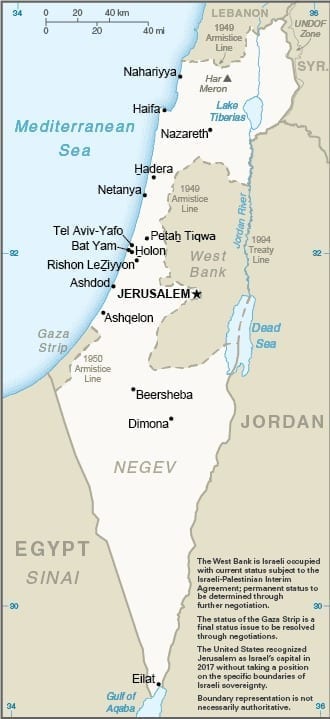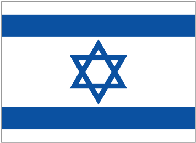Official Name: State of Israel
Internet Domain: .il
International Dialing Code: +972
Location and Size
Israel is a Middle Eastern country located between Egypt and Lebanon. It borders the Mediterranean Sea and its land area is 20,330 sq.km ” slightly larger than the state of New Jersey. It is the 100th smallest country in the world and has 1/1000th of the world’s population.
Government
Israel is a parliamentary democracy made up of six districts.
Executive Branch: Chief of State: President Reuven RIVLIN; Head of Government: Prime Minister Benjamin NETANYAHU; Cabinet: selected by the prime minister and approved by the Knesset
Legislative Branch: Unicameral Knesset of 120 seats
Judicial Branch: Supreme Court, justices are appointed by a Judicial Selection Committee made up of all three branches of the government
Legal System
Israel has a mixed legal system comprised of English common law, British Mandate regulations, and Jewish, Christian and Muslim religious law.
Israel has not submitted an International Court of Justice (ICJ) declaration.
Interesting Facts About Israel
- Motorola’s largest development center, which developed the cell phone, is located in Israel
- Voice mail technology was developed in Israel
- Israel has the fourth largest air force in the world (after USA, Russia, China)
- Israel produces more scientific papers per capita than any other nation
- Israel is the only country that entered the 21st century with a net gain in its number of trees
- Israeli bank notes are imprinted with braille characters so they can be identified by the blind
- Israel’s $100 billion economy is larger than all of its immediate neighbors combined
- The first PC anti-virus program was developed in Israel in 1979
- Both Microsoft and Cisco built their only non-US R&D facilities in Israel
Economy
Strong trade and investment ties outside of the Middle East insulate Israel’s technologically advanced free-market economy from regional political instability. The government plans further economic liberalization, but fiscal consolidation has been deferred in favor of populist spending and tax measures demanded by the governing coalition. Competitiveness is enhanced by strong protection of property rights, efficient coordination of regulatory processes, and a sound judicial framework that sustains the rule of law.
Leading Markets (2018): US 35%, Hong Kong 6%, Belgium 5%
Leading Exports – Commodities: Machinery and equipment, software, cut diamonds, agricultural products, chemicals, textiles and apparel
Leading Suppliers (2018): US 12.3%, China 7.4%, Germany 7.1%, Switzerland 6.9%, Belgium 5.4%, Italy 4.5%, UK 4%
Leading Imports – Commodities: Raw materials, military equipment, investment goods, rough diamonds, fuels, grain, consumer goods
Top Industries: High-technology products (including aviation, communications, computer-aided design and manufactures, medical electronics, fiber optics), wood and paper products, potash and phosphates, food, beverages, tobacco, caustic soda, cement, construction, metals products, chemical products, plastics, diamond cutting, textiles, footwear
Top Agricultural Products: Citrus, vegetables, cotton; beef, poultry, dairy products
Comparative Economic Indicators – 2018
| Israel | Lebanon | Syria | Jordan | Egypt | Turkey | |
|
Population*
(millions)
|
8.5 | 4.1 | 22.5 | 6.5 | 82.1 | 78.8 |
| Population growth rate* (%) | 2 | 0.2 | 0.9 | 1.0 | 2.0 | 1.2 |
|
Age Structure (%)
(15 to 64 years old)
|
62.2 | 68.0 | 61.0 | 59.9 | 62.8 | 67.1 |
| Literacy (%) | 97.1 | 87.4 | 79.6 | 89.9 | 71.4 | 87.4 |
| Unemployment rate (%) | 6.4 | NA | 8.3 | 13.4 | 9.7 | 12.4 |
| Inflation (%) | 2.6 | 3.7 | 5.9 | 4.4 | 12.8 | 8.7 |
| Population below poverty line (%) | 23.6 | 28.0 | 11.9 | 14.2 | 20.0 | 17.11 |
|
GDP**
(USD billions)
|
318.7 | 59.4 | 107.4 | 34.5 | 497.8 | 960.5 |
| GDP real growth rate (%) | 4.0 | 7.5 | 3.2 | 3.1 | 5.1 | 8.2 |
| GDP per capita** (USD) | 37,292.61 | 14,400.0 | 4,800.0 | 5,400.0 | 6,200.0 | 12,300.0 |
| Public debt (% of GDP) | 41.6 | 150.7 | 29.8 | 61.4 | 80.5 | 48.1 |
| Exports (USD billions) | 54.3 | 5.2 | 12.8 | 7.3 | 25.3 | 117.4 |
| Imports (USD billions) | 55.6 | 18.0 | 13.9 | 13.0 | 46.5 | 166.3 |
| Reserves of foreign exchange and gold (USD billions) | 67.0 | 41.6 | 18.0 | 12.6 | 35.7 | 78.0 |
| Currency | New Shekel ILS |
Pound LBP |
Pound SYP |
Dinar JOD |
Pound EGP |
Lira TRY |
| Exchange rates (per USD) 05/29/2018 | .28 | 0.00066 | 2.00 | 1.41 | .50 | .22 |
| Exchange rates (per EUR) 05/29/2018 | .24 | .00057 | 595.04 | 1.0 | 8.4 | 2.4 |
Credit and Collections
Dispute Resolution
Israel has a written and consistently applied commercial law based on the British Companies Act of 1948. Its commercial law contains standard provisions governing company bankruptcy and liquidation. The country is a member of the International Center for the Settlement of Investment Disputes (ICSID) and the New York Convention of 1958 on the Recognition and Enforcement of Foreign Arbitral Awards.
Risk Assessment
Coface Country Rating: A2 — Changes in generally good but somewhat volatile political and economic environment can affect corporate payment behavior, giving rise to occasional company difficulties in making payments. However, in general, corporate default probability is quite acceptable.
Coface Business Climate Rating: A2 — The political and economic situation is good. This basically stable and efficient business environment nonetheless leaves room for improvement. Corporate default probability is low.
Israeli companies in general proved resilient to the global crisis and the credit crunch, the increase in bankruptcies notwithstanding. As the economy recovered, their financial position firmed up accordingly especially with their generally prudent management policies having prompted them to set aside reserves. In this context, Coface monitoring records reflect improvement in the payment behavior of Israeli companies, which is expected to remain satisfactory and better than the world average.
Business Climate
Despite the challenging global economic environment, Israel’s economy has been on a path of well-balanced recovery. With an increasingly diversified product base and ongoing structural reforms, annual growth has been close to 4% for the past five years. Israel’s economic competitiveness is anchored in strong protection of property rights and relatively low levels of corruption, as well as openness to global trade and investment.
Economic Freedom: Israel’s economic freedom score is 72.8, making its economy the 27nd freest in the 2019 Index. Its overall score increased by 0.6 point since last year’s index. Israel is ranked 2nd out of 14 countries in the Middle East/North Africa region. (2018 Index of Economic Freedom).
Regulatory System: It is government policy to encourage increased competition through market liberalization and deregulation, but tax, labor, health, and safety laws can be impediments to the foreign investor. Despite the current trend towards deregulation, Israel’s bureaucracy can be difficult to navigate, especially for foreign investors unfamiliar with the system. It is important that potential investors get approvals or other commitments in writing from regulatory officials.
Intellectual Property Rights: Israel is a Member of the WTO and the World Intellectual Property Organization (WIPO). It is a signatory to the Berne Convention for the Protection of Literary and Artistic Works, the Universal Copyright Convention, the Paris Convention for the Protection of Industrial Property, and the Patent Cooperation Treaty. Israel has also implemented the WTO Agreement on Trade-Related Aspects of Intellectual Property Rights (TRIPS).
Exchange Control: Foreign-currency controls have been completely abolished, and the Israeli shekel has become a freely convertible currency.
Corruption: Israel’s government and public organizations are fairly free from corruption. Bribery and other forms of corruption are illegal under several Israeli laws and Civil Service regulations.
Political Violence: Israel is a parliamentary democracy with a stable domestic environment. Nonetheless, the unresolved conflict between Israel and the Palestinians means that the potential for politically inspired violence and terrorism exists. The State Department web site provides updated information on travel advisories: http://travel.state.gov.
Business Protocol in Israel
- Maintain direct eye contact. If the Israeli is standing a little too close – invading your private space – it’s normal. Taking one step back may make you feel more comfortable but your communication will not be as well received.
- Business dress in Israel is in general Euro-American and usually classified as casual. Having said that, Israelis expect foreign guests to dress in higher quality, visibly branded items that reflect their own country’s standards for high-end business-casual attire.
- Israel’s culture and society operate on a “first name basis” so any business or personal relationship, given the atmosphere is friendly and cooperative, will quickly move to a first name basis.
- Israeli business style and culture is primarily American/West European and visiting businesspersons will encounter few challenges and cultural anxieties when interacting with Israelis. While connections, business acquaintances and referrals are always an asset, Israelis are globally oriented and value international relationships to a degree that rarely requires third party “introductions” as a crucial facilitation mechanism.
Sources for further information on doing business in Israel
Association of America-Israel Chambers of Commerce
Doing Business in Israel, U.S. Commercial Service Israel
Embassy of Israel, Washington, DC
Israel-America Chamber of Commerce & Industry
**********
Subscribe to the Credit-to-Cash Advisor
Monthly e-Newsletter — It’s Free
This information is provided by ABC-Amega Inc. Providing international receivable management and debt collection services for exporters to more than 200 countries including Israel. For further information, contact [email protected].
This report represents a compilation of information from a wide variety of reputable sources.
Comparative Economic Indicators: CIA World Factbook
Risk Assessment information: Coface Country Rating
Exchange Rates: OANDA.com The Currency Site.

